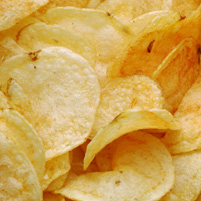Sweet Satisfaction

While you may not be able to stop after just one, simply imagining yourself eating a bag of potato chips could keep you from going overboard.
A new study by Carnegie Mellon researchers, published in Science, shows that when you imagine eating a certain food, it reduces your actual consumption of that food. (See ABC News video.)
The landmark discovery changes the decades-old assumption that thinking about something desirable increases cravings for it and its consumption.
The researchers drew on past studies underscoring the power visualization can play in ‘tricking’ the brain.
“These findings suggest that trying to suppress one’s thoughts of desired foods in order to curb cravings for those foods is a fundamentally flawed strategy,” said CMU’s Carey Morewedge.
Morewedge is an assistant professor of social and decision sciences and lead author of this study.
He added, “We think these findings will help develop future interventions to reduce cravings for things such as unhealthy food, drugs and cigarettes.”
CMU’s research team included Young Eun Huh, Tepper School of Business Ph.D. candidate, and Joachim Vosgerau, assistant professor of marketing.
The group ran a series of five experiments. In the first experiment, participants imagined performing 33 repetitive actions, one at a time:
- A control group imagined inserting 33 quarters into a laundry machine (an action similar to eating M&M’S).
- A second group imagined inserting 30 quarters into a laundry machine and then imagined eating 3 M&M’S.
- A third group imagined inserting three quarters into a laundry machine and then imagined eating 30 M&M’S.
Next, all participants ate freely from a bowl filled with M&M’S.
Participants who imagined eating 30 M&M’S actually ate significantly fewer M&M’S than did participants in the other two groups.
Researchers ran additional experiments ensuring that other factors weren’t influencing the results (see press release for additional methodology).
Additionally, the study showed it wasn’t enough to merely think about the food – or to think of another food.
It was important to imagine the act of eating the very food in question.
“To some extent, merely imagining an experience is a substitute for actual experience,” said Vosgerau. “The difference between imagining and experiencing may be smaller than previously assumed.”
This research was funded by a grant awarded to Morewedge from the Berkman Faculty Development Fund at Carnegie Mellon.
Related Links: ‘Imagination Diet’ on ABC News | ‘Just Thinking Harder …’ on NPR | ‘To Prevent Overeating...‘ on CBS News | SDS | Tepper School of Business
